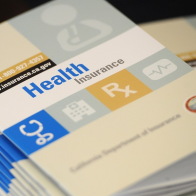
Mental health is finally permeating the national conscious, as more and more high-profile cases find there way into the newsroom. Although television programs dealing with the topic of mental health can deceive us, making us feel as if doctors have all the answers if only we seek them out, new research suggests that securing proper health care for mental illness is increasingly difficult for a certain segment of Americans.
Unfortunately, according to a report out of California’s Department of Mental Health, many “regular” folk of color are not only oblivious to where to receive adequate mental health care, but once they do find a doctor, they are often over or under-diagnosed by medical professionals.
The investigation found that the fragmented delivery of mental-health services in California exposes blacks to inappropriate or inadequate diagnoses and is responsible for a high rate of involuntary commitments, said V. Diane Woods, the president of the African American Health Institute of San Bernardino County.
 Despite the fact that this story doesn’t mention anything about the rise of prescription drug abuse, this issue does correlate with studies that claim that America is almost at national epidemic status, if it’s not already there now.
Despite the fact that this story doesn’t mention anything about the rise of prescription drug abuse, this issue does correlate with studies that claim that America is almost at national epidemic status, if it’s not already there now.
In 2011, The Obama Administration laid out its plan to reinvigorate conversations in American’s homes and in doctor’s offices about the dangers of prescription drug abuse, but, in the same token, its plan does little to address this new research, which seems to illuminate why it’s important that residents and medical students don’t cheat on their exams.
Additionally, the study reiterates previous work that uncovered the stigma many blacks associate with mental illness. According to this study, black folks still appear to be apprehensive about seeking help for the fear of being labeled “crazy.”
Clutch’s Danielle Benton, who herself deals daily with the scars of her past severe depression, writes powerful pieces about her struggle to come to grips with her mental illness, and how liberating it is to exorcise her “demons” through print, dealing with them head-on and not running from the situation.
Looking back on how far she’s come, Belton encouragingly writes, “this is very much preferable to my ‘old’ coping technique of ‘hope it goes away on its own.’ But I’m not going to pretend like it was easy to get to that point. It was a lot of hard work.”
Belton’s story empowers folks dealing with mental illness, but now, more than ever, we need more people to have the courage to help others feel comfortable with sharing their struggles while holding the Obama Administration to its words.
This new report will be formally released during a town-hall meeting and workshop from 9 a.m. to noon Tuesday at the Los Angeles Airport Westin Hotel.






